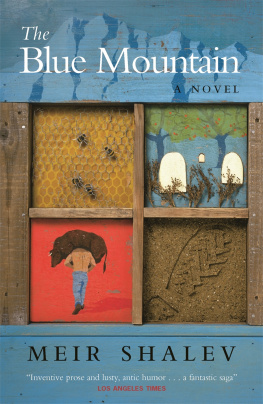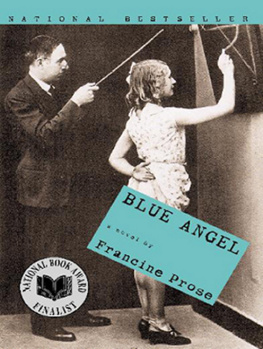ToBatya, my mother
O ne summer night the old schoolteacher Yaakov Pinness awoke from his sleep with a great start. Im screwing Libersons granddaughter! someone had shouted outside.
High, brazen, and clear, the shout winged past the Canary Isle pine trees near the water tower. For a moment it hovered like a bird of prey before swooping earthwards to the village. The old teacher felt a familiar twinge of pain. Once more he alone had heard the obscene words.
For years he had chinked every crack, repaired every rent, stood in the breach every time. Like the Dutch boy plugging the dyke, he would say as he beat back yet another threat. Fruit aphids, state lotteries, cattle ticks, anopheles mosquitoes, bands of locusts and jazz musicians swirled around him like dark waves before breaking in a slimy froth against the breastwork of his heart.
Pinness sat up in bed and wiped his fingers on the hair on his chest, perplexed and enraged that life in the village could go on as usual when such debauchery publicly thumbed a nose at it.
The little co-operative settlement in the Valley of Jezreel was sound asleep. The mules and cows in their sheds, the hens in their coops, the visionary men of toil in their humble beds. Like an old machine whose parts were used to each other, the village purred routinely in the night. Udders filled with milk, clusters of grapes swelled with juice, prime beef waxed fat on the joints of calves soon to be sent to the slaughterhouse. Tireless bacteria, our one-celled friends, as Pinness appreciatively called them in the classroom, laboured to fix fresh nitrogen at the roots of plants. But notoriously patient and even-tempered though he was, the old educator was determined to let no one, least of all himself, rest on the laurels of productivity and past achievement. Ill catch you yet, you degenerate, he mumbled irately, jumping heavily from his iron bed. His hands trembled as he buttoned his old khaki pants and pulled on his confidence-inspiring black work boots in preparation for the fray. He was too upset to find his glasses in the dark, but the moonlight shining through the cracks in the door showed him the way.
Outside he tripped over a molehill subversively dug in the garden. He picked himself up, brushed himself off, called out, Whos there? and waited intently for an answer, his myopic eyes boring into the night while his large hoary head swivelled back and forth like an owls.
The lecherous shout was not repeated. It never was. Each time it was sounded but once.
The coarse words, Pinness brooded, were a battle cry of decadence, of mean hedonism, of individualism run wild in short, of gross breach of conduct. Reluctantly the old teacher, under whose tutelage our children were reared to a life of high ideals and hard work, recalled the great chocolate robbery, in which several of his eldest pupils had raided the village co-op; the steamer trunk of Riva Margulis, which had arrived from Russia bursting with seductive luxuries and outrageous frills; and the devilish laughter of the hyena haunting the fields outside the village, smirking and up to no good.
The thought of the hyena when he was without his spectacles and unable to see a thing plunged the alarmed Pinness into an all but paralysing anxiety.
The hyena was a sometime visitor to the area, a messenger unleashed from the worlds that lay beyond the wheat fields and the blue mountain. Several times in the years since the founding of the village the old teacher had heard its clear, mocking bark ring out from the nearby wadi, and a shiver had run down his spine.
The hyenas bite was highly dangerous. Some of its victims were so badly infected that they sowed penicillaria in autumn and pruned their vineyards in summer. Others took leave of their senses and became doubters, cynics, even turncoats, forsaking the land and drifting off to the city, or else dying or even leaving the country.
Pinness was beside himself with worry. He had lived long enough to see the many fallers by the wayside, the slinking deserters re-embarking in the ports, the haggard suicides at rest in their graves. He saw renegades and deviants everywhere The parasitic Talmudists of Jerusalem, the messianic millenarians of Safed, the credulous Communists, disciples of Lenin and Michurin, who were the ruin of the Workers Brigade. Long years of observation and reflection had taught him how easily a man was struck down once his immune system failed him.
It especially attacks children, because their young minds are still vulnerable, he warned, demanding that the schoolhouse be guarded around the clock when the scurrilous creatures tracks were discovered near the farmers houses. At night he joined the posse of young men, his former pupils, who sought to track the fiend down. But the hyena was wily and elusive.
Like other traitors weve known, said Pinness at one of the villages general meetings.
One night when he was out hunting shrews and tree toads for the school nature corner, he saw the hyena cross the planted fields on the other side of the wadi and come toward him with the steady, distance-devouring lope of a wild beast. Pinness stopped in his tracks while the creature fixed its bright orange eyes on him and purred seductively. He could clearly make out the large, sloping shoulders, the bulging jaws, and the striped coat that swelled and bristled along the ridged backbone.
The hyena quickened its pace, trampling the tender vetch sprouts, and threw the old pedagogue a last mocking smile, baring its purulent fangs as it vanished into a wall of sorghum. Only when he realised that he had forgotten to take his gun along did Pinness understand the reason for that sly grin.
Pinness always forgets his gun, said the farmers upon hearing of the nocturnal encounter. They still recalled how, long ago, when the village was newly founded and Pinnesss wife Leah died of malaria while pregnant with twin daughters, he had risen from the deathbed of his beloved, whose body continued to exude green sweat even after it was cold and still, and taken off on the run for the copse of acacia trees in the wadi that was a popular spot for suicides. Several friends who rushed to the rescue found him lying among the golden thistles, sobbing bitterly. He forgot his gun then too.
Now, thinking agitatedly of the abominable beast, of his dead wife, and of her two blue, sinless foetuses, Pinness stopped shouting, Whos there?, returned to his room, found his glasses, and hurried off to my grandfather.
Pinness knew that Grandfather rarely slept. He knocked and entered without waiting, the slam of the screen door waking me up. I glanced at Grandfathers bed. As usual it was empty. The smell of his cigarette drifted in from the kitchen.
I was fifteen years old. Most of those years had been passed in Grandfathers cabin. He had raised me with his own hands, the hands of a planter. Under his watchful eyes I had grown, bound tightly by the heavy raffia of his yarns. In the village I was known as Mirkins orphan, but Grandfather, a man merciful, zealous, and vengeful, never called me anything but my child.
He was as old and pale as though he had dipped himself in the white unguent he painted the trunks of his fruit trees with each spring. He was also short, sinewy, moustached, and mostly bald, with eyes that had slowly receded into their sockets and lost their lustre until they had come to resemble grey, nebulous rock pools.
On summer nights Grandfather liked to sit at the kitchen table in his faded undershirt and blue shorts, filling the room with smoke and good, woody, milky smells while swinging viney legs that were gnarled from work, and reliving old memories and iniquities. He had a habit of jotting down his thoughts on scraps of paper, which later flew about the room like swarms of migrating butterflies. He kept awaiting the return of whomever he had lost. To see them again become flesh before my eyes, I once found written on a note that fluttered into my hand.
Next page










